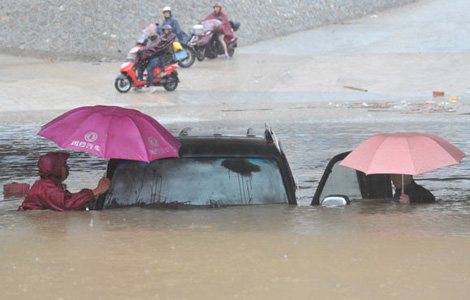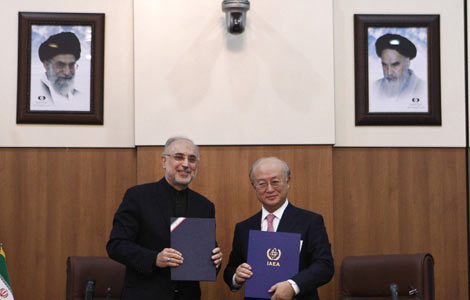Sasser: An optimistic realist on US-China relations
Updated: 2013-11-12 09:26
By CHEN WEIHUA in Washington (China Daily USA)
|
||||||||
|
|
|
Video by Cai Chunying, click here to watch on Youtube |
To former US ambassador to China James Sasser, relations between the US and China have improved dramatically since the late 1990s when he served in Beijing.
He arrived there in early 1996 amid high tensions across the Taiwan Straits. The Chinese People's Liberation Army was firing missiles to send a warning to then Taiwan leader Lee Teng-hui, who was attempting to move away from the "One China" policy, and the US sent an aircraft carrier battle group to the region.
Tensions across the Straits have since dissipated and cross-Straits ties in the past year have been regarded as the best ever.
On Tuesday evening in Washington, both Sasser and Lien Chan, the honorary chairman of Taiwan's Kuomintang (KMT), will be presented Lifetime Achievement Awards by the US-China Policy Foundation for their respective contributions to US-China relations and cross-Straits relations.
"We have improved relations from that low point, I think, now, very substantially," Sasser told China Daily on Monday in his office in APCO Worldwide, where he is a senior counselor.
While saying that there is always a danger, Sasser does not see conflict between the two largest economies as inevitable.
Instead, he said leaders of the two countries are working very diligently to build on the foundation that has been laid by past leaders of the two nations.
In Sasser's view, the US needs to create more space for China. "I think the United States needs to learn from history," he said.
The conflict between Germany and Britain and France a century ago was due to the fact that the "British wouldn't make room for Germany's rising power and the French did not want to acknowledge their rising power", Sasser said.
"But that doesn't necessarily have to happen and I do not believe there will be a conflict between China and the United States anytime in the foreseeable future," he said, adding that foreseeable future means the next 30 to 40 years.
He said the US and many other countries realize that China is now a rising power. "It's taking its rightful place in the world," he said.
"We have to remember that China up until 1845 was one of the leading countries in the world and had the largest economy of any nation," he said.
"China is simply coming back now," said Sasser, who also serves as vice-chairman of the National Committee on US-China Relations.
Sasser believes the two nations need to work hard to make sure there are no misunderstandings and recognize that both sides have a legitimate interest in certain areas in the world, such as in safeguarding their own security, coastlines and waters.
While admitting a deficit of trust between the two countries, Sasser said there is more trust now than when he went to China as ambassador in 1996.
"Certainly there is going to be competition because as China continues to rise economically, there is going to be competition for markets and competition for raw materials, etc. That doesn't mean it needs to lead to conflict," he said.
Sasser said he'd like to see President Barack Obama concentrate more on China, saying that regular high-level meetings would help reduce distrust and set the stage for solving some of the problems that plague bilateral relations.
Sasser, who served as US Senator from Tennessee from 1977 to 1995, sees enormous potential for more exchanges between the two countries.
While the Chinese side is often upset by what's happening in the US Congress regarding China, Sasser believes the Chinese have made a lot of progress with the Congress in the last 15 years.
He had tried to bring as many US Congressmen to visit China as possible when he was ambassador there, visits Sasser said had good effect.
"They came to China and saw the country developing economically and saw the people were reasonably happy. They think it's helpful," he said.
Sasser believes the arrivals in the US of Chinese media, such as China Daily and CCTV, are good examples of China making the right steps in trying to shape public opinion and reach out to the American public.
He believes more exchanges from a cultural standpoint between the two countries will be very helpful.
"There are so many Chinese students studying in the United States. I think that also has a very beneficial effect on the relationship between the two countries," he said.
"It also has a very beneficial effect on some in the Congress, because many of these students are studying in their congressional districts. They come to realize that they are valuable assets," said Sasser.
The 2013 Open Doors report issued by the Institute of International Education on Monday shows that there were about 236,000 Chinese students in US universities and colleges in the 2012-13 academic year, accounting for nearly 29 percent of the total international student body.
Sasser claims that he is an optimistic realist. "I am realistically optimistic about the future relationship," he said.
"I think there are going to continue to be problems, continue to be tensions, but I think this relationship is stable and strong," Sasser said.
chenweihua@chinadailyusa.com

 PANDA! set to debut in Las Vegas
PANDA! set to debut in Las Vegas
 Lest we repeat the horrors of the past
Lest we repeat the horrors of the past
 Haiyan toll rises in Guangxi, Hainan
Haiyan toll rises in Guangxi, Hainan
 US honors its veterans with ceremonies, parades
US honors its veterans with ceremonies, parades
 Carnival season kicks off in Cologne
Carnival season kicks off in Cologne
 Typhoon Haiyan claims 6 in S. China
Typhoon Haiyan claims 6 in S. China
 Iran to give UN inspectors more access to nuclear sites
Iran to give UN inspectors more access to nuclear sites
 In love with Yunnan
In love with Yunnan
Most Viewed
Editor's Picks

|

|

|

|

|

|
Today's Top News
Xiamen Air gets milestone 100th Boeing
Alaskan seafood stars in Singles' Day
Third Plenum speaks in broad but telling strokes
China and US should focus on the 'big picture'
Leadership charts path
China can curb pollution: UN
China, EU 'to launch investment treaty talks'
Obama's Iran legacy at stake
US Weekly

|

|






